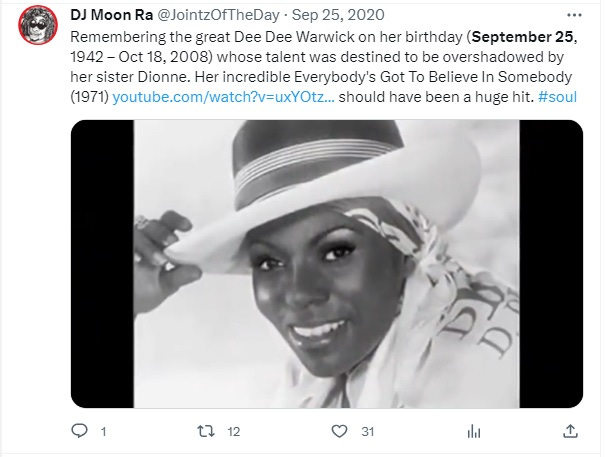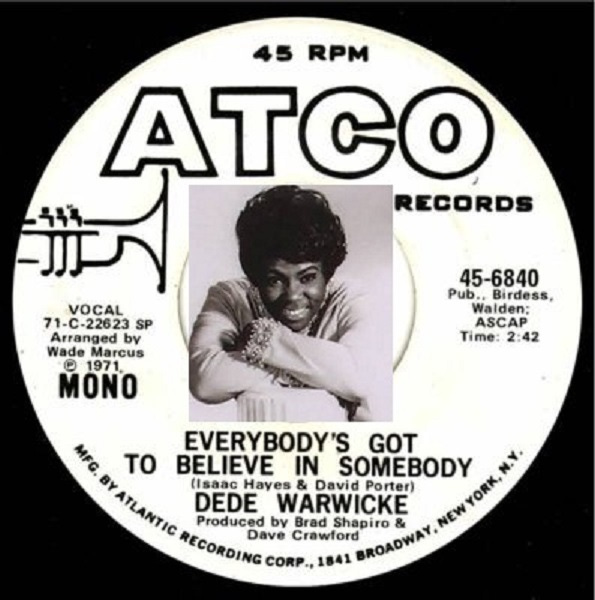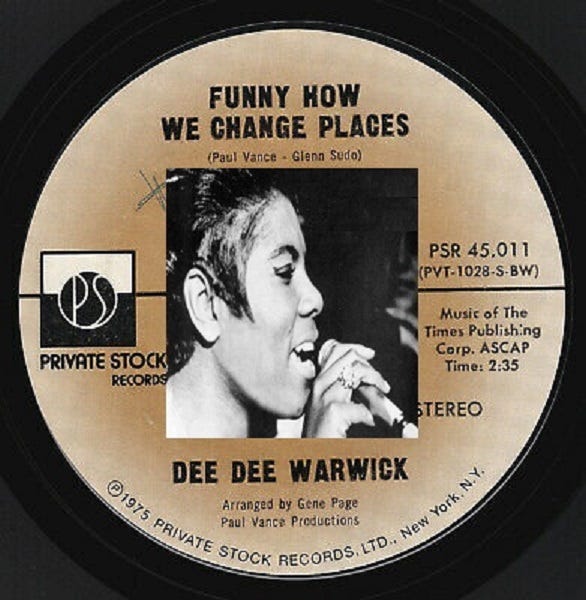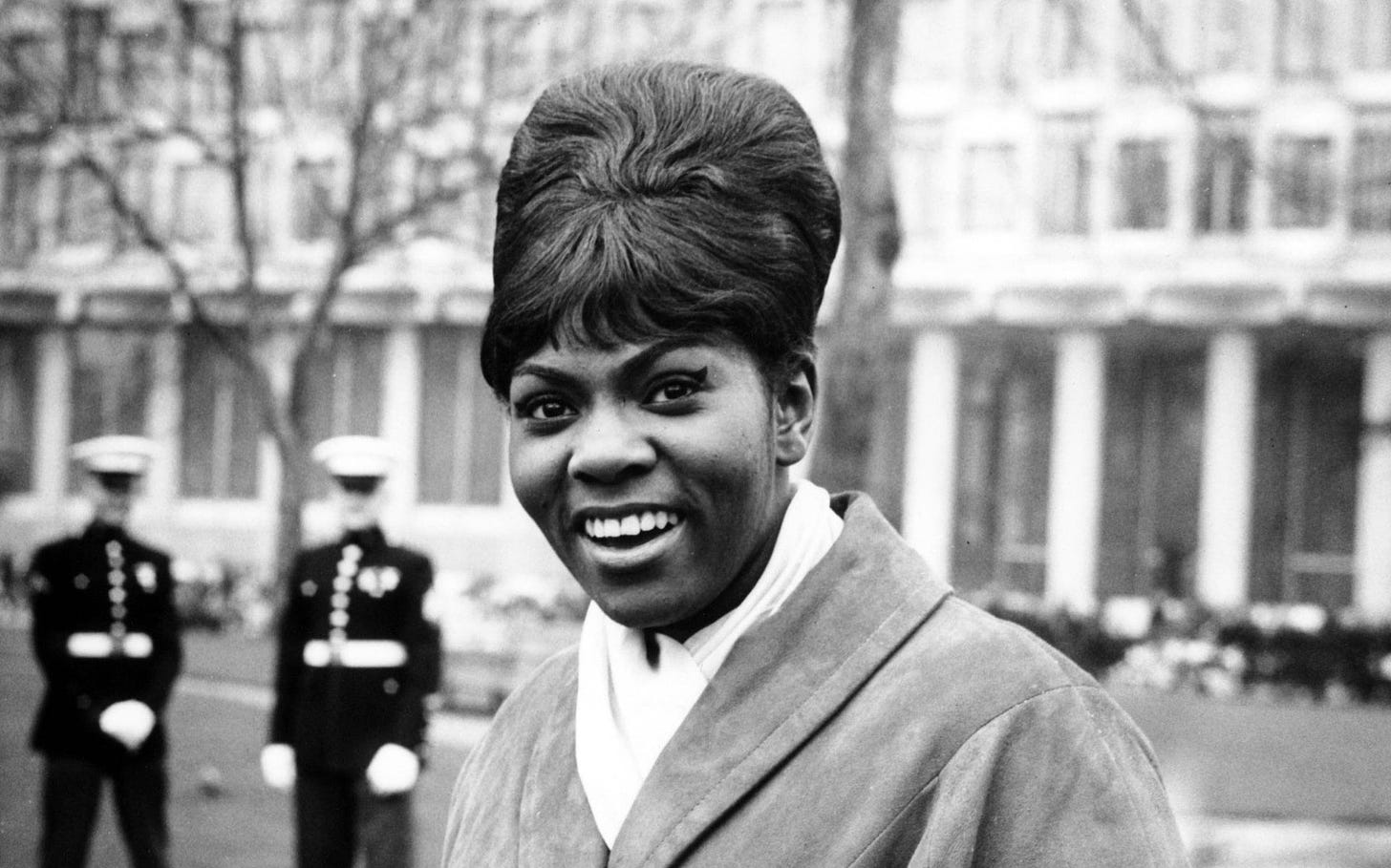Dee Dee Warwick (September 25, 1942 – October 18, 2008) – Everybody's Got To Believe In Somebody (1971)
Co-written by Isaac Hayes and David Porter, this phenomenal single should have been a big hit for the singer who was overshadowed by her sister Dionne.
Watch full video on YouTube.
View most updated version of this post on Substack.
Dee Dee Warwick was one of the first openly lesbian performers, and began her career in the 1950s singing in a gospel trio with her sister Dionne and aunt Cissy Houston.
Born Delia Mae Warrick in Newark, New Jersey, as a teenager she sang with her sister Dionne and their aunt Cissy Houston in the church choir at New Hope Baptist Church in Newark. They eventually formed a trio called the Gospelaires, and often performed with The Drinkard Sisters. Houston was also a member of that gospel group, managed by her sister (and Dee Dee’s mother) Lee Drinkard-Warrick. Eventually Dee Dee and Dionne also joined the Drinkard Sisters. They performed at the Newport Folk Festival in 1957, and then released the first gospel album on a major label, A Joyful Noise, released by RCA in 1959.
That same year, after both groups appeared at the Apollo in Harlem, Dee Dee and Dionne were asked by a producer to come sing background on a session. They both began working as session singers in the New York City region. It was during one background session in 1962 that Dionne was noticed by songwriter Burt Bacharach. He hired her to provide vocals for his demos, a break that would soon lead to her becoming one of the sixties’ biggest female vocalists.
Dee Dee began her own solo career in 1963 by recording the original version of Linda Ronstadt’s future mega-hit “You’re No Good,” written by Clint Ballard, Jr. and produced by Jerry Leiber and Mike Stoller. She signed with Mercury Records in 1965, where she released the original version of “I'm Gonna Make You Love Me” (1966). Co-written by Kenny Gamble, Leon Huff, and Jerry Ross, and featuring a young Ashford & Simpson on backing vocals, her single went to #13 R&B and #88 on the Billboard Hot 100. But the song became much more famous two years later when it was re-done as a duet between the Supremes and Temptations. She left Mercury for Atlantic’s subsidiary Atco in 1970, where one of her biggest records was a cover of Elvis Presley’s chart-topping 1969 hit “Suspicious Minds.” Her version was released in 1971 and reached #24 R&B and #80 on the Hot 100.
Warwick was destined from the start to be overshadowed by her sister’s superstardom. Later, she also found it hard to shine because of her labelmates Aretha Franklin and Roberta Flack, whose talent crowded out Atlantic’s other female artists. “The problem was simply, that the company had a lot of other big female acts,” said Warwick years later, “and you get into a situation, where you don't get the right kind of material or production or promotion.” And the world wasn’t yet ready in the 1960s or early 70s for openly lesbian artists.
For all these reasons, the record buying public missed out on her phenomenal 1971 single “Everybody's Got To Believe In Somebody,” which should have been a big hit.
It was co-written by Isaac Hayes and his songwriting partner David Porter, produced by Brad Shapiro and Dave Crawford, and recorded at Pac-Three studios in Detroit. Shapiro had already produced hits for Henry Stone’s Miami labels, often working with Steve Alaimo on records for singers including Benny Latimore, Clarence Reid and Betty Wright.
Three years later, Warwick charted for the last time with the laid back “Get Out Of My Life” (1974) which peaked at #73 R&B. Its B-side was the stellar jam “Funny How We Change Places,” which became a modern soul classic.
Co-written by Paul Vance and Glenn Sudo, “Funny How We Change Places” was arranged by the great Gene Page.
Sadly, the reason many people have likely heard of Dee Dee Warwick today is that in 2018, a documentary was released in which her younger cousin Whitney Houston’s former personal assistant alleged Whitney had confided she was molested by Dee Dee at a young age. Whitney’s brother Gary Garland-Houston also said, according to news reports, that “a female relative had molested him when he was between seven- and nine-years-old; and that Houston had also been victimized at the time.”
At the time the documentary was released and the allegations made public, Dee Dee had been dead for ten years, and Whitney for six. Both Dionne Warwick and Cissy Houston denied having ever previously heard anything about the allegations. “All I can say about Dee Dee is that she was a loving, caring, giving person,” Dionne told People magazine. “What was depicted of her is absolutely untrue and something I will never forgive.” Houston released a statement that said, in part:
“We cannot reconcile the Public's need to know about Whitney's life as justification for invasion of her privacy or the charge against Dee Dee, a charge which neither Whitney nor Dee Dee is here to deny, refute or affirm. Neither I, Dionne, nor my son Michael who was very close to his sister ... has ever heard these allegations; we have never heard anything remotely connected to the crimes charged against Dee Dee in the film.”
In 2005, three years before her early death at age 66 (mis-stated as 63 by The New York Times in their obituary, a final reminder of her relative obscurity), Warwick sat for a lengthy career retrospective interview (h/t to @SmoothJazz0204 for pointing out this interview).
Further info:
“Dee Dee Warwick, Soul Singer and Sister of Dionne Warwick, Is Dead at 63,” obituary, The New York Times, October 21, 2008.
“Dee Dee Warwick,” obituary, The Guardian, October 28, 2008.
“Dee Dee Warwick: Lost Soul Sister,” by Cat Celebrezze, Perfect Sound Forever, April 2017.
“Dionne Warwick says accusations her sister Dee Dee molested Whitney Houston when she was a child were 'absolutely untrue',” by Adam S. Levy, Daily Mail, May 8, 2019.
#soul #DeeDeeWarwick








I have to confess that I’d heard a rumor in the 60s that Little Eva had alleged that Dee Dee Warwick had raped her. That’s all I'd heard.